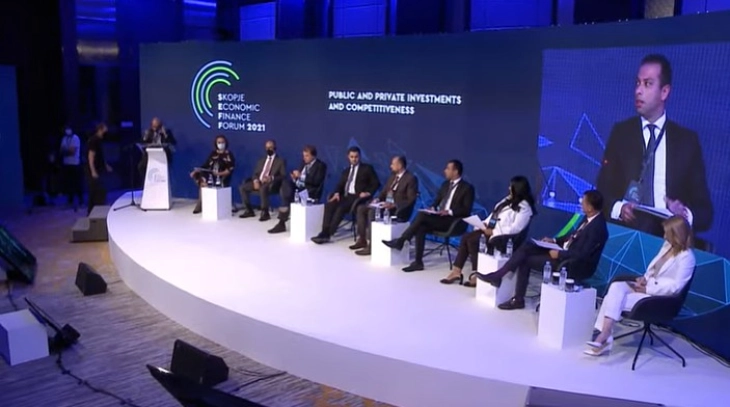Green lanes in Western Balkans to connect with those in EU: panel

Skopje, 7 September 2021 (MIA) – The “green lanes” concept, promoted in the Western Balkans as a temporary and fast response to the Covid crisis for all cross-border activities among the countries, has proven to be one of the most successful examples of regional cooperation. The greatest achievement to preserve the economic flows in the region not only provided economic benefits, but also immensely beneficial measures to protect population in times of a pandemic, North Macedonia’s Minister of Transport and Communications, Blagoj Bochvarski, told a panel on “Public and Private Investments and Competitiveness” within the “Economic Recovery and Growth beyond Covid” conference.
Bochvarski stressed that innovative ways need to be found to mitigate the consequences of the crisis, but also to offer sustainable solutions for the future.
“One solution is regional trade cooperation by free movement of people and goods, and timely supply of goods whenever it’s necessary and where they’re most needed. That’s why connecting these two concepts of green lanes, which has been accepted by the EU but also accepted by the WB6 – and this involves a set of joint measures to tackle the crisis, is of vital importance. The pandemic situation is currently stable, but given the uncertainty brought about by the Covid crisis and given that this is still an ongoing crisis that affects us all, mutual coordination and cooperation need to continue at an increasing pace,” the Minister said.
According to him, green lanes need to be strengthened in the entire region together with the EU, in order to enable free trade flow, particularly basic medical supplies and food.
Additionally, Bochvarski noted, road safety, trade and transport facilitation at border crossings, transport liberalization and digitalization can enable the free flow of goods.
“There is great public interest by the business community in accelerating these improvements and introducing green lanes at border crossings. Bilateral agreements with neighboring countries are an effective tool for improving border crossings, reducing travel time and border queues. Currently, the joint railway station project with the Republic of Serbia is in the process of implementation. The total estimated value of the investment is EUR 5.2m. The project includes construction of a new, modern joint station in line with European Union standards,” said Bochvarski.
In addressing the pandel, Economy Minister Kreshnik Bekteshi focused on reforms in the energy sector. Bekteshi also stressed the importance of tourism, which, according to him, was one of the hardest hit sectors by the crisis, but also one of those that received the greatest financial support.
Other participants in the panel included Deputy PM for Economic Affairs Fatmir Bytyqi, VP of the European Investment Bank Lilyana Pavlova, EBRD First Vice President Jürgen Rigterink, IFC CESEE Regional Manager Ary Naim, as well as representative of the three largest chambers of commerce.







